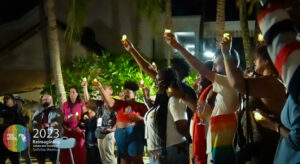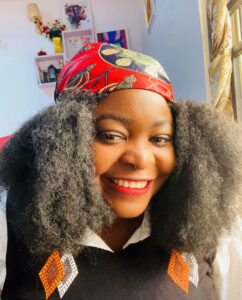For LGBTQIA+ persons in Africa, our very existence is a struggle to stay alive. Activism is a pathway foisted upon us by our lived realities without our consent. We go to bed thinking of how to make our world livable for ourselves and wake up the next morning thinking of how to make it safer for those like us. Out on the streets, we watch our backs and that of our queer siblings, becoming watchdogs trained by our experiences. When you exist like this, Pride becomes not just a celebration of resilience, hope, and solidarity but a protest against the world that conspires to erase us through brutality and silencing.
On August 3, 2023, we LGBTQIA+ Africans had our first in-person continental Pride in Africa through Pride Afrique. Prior to this, Pride Afrique was organized annually as a virtual continental event since 2020.
As I carried the mantle of leadership to curate the event, I thought back to the first time I saw photos from a Pride event in Africa. I was 21, staring down at the black and white photos from the 1990 Johannesburg Pride. I was struck by the fact that in such an era, Africans were bold enough to come out on the streets together.
Outside isolated Pride events in several countries later like the African Pride Accelerated in Nigeria, the Ugandan Pride, Pride in Mauritius, and Capetown Pride, amongst others, we had never had an in-person Pride at the continental level before. What a timing when safety has come to mean different things to LGBTQIA+ persons in Africa with an increase in hostile legislation and policies targeted at the community. Anti-LGBTQIA+ organising has become a pastime for populist leaders and religious fundamentalists, fueling hate with direct effect in reducing the accountability of state actors to human rights violations, commitment to human rights treaties and the creation of laws that can protect us. This has increased homophobia, transphobia, biphobia, interphobia and other forms of aggression towards us.
Beyond legislation, harmful practices have continuously been meted out to the community, with physical and mental violence, including medical and faith-sanctioned conversion practices on the increase, utilizing digital spaces to target vulnerable persons who ordinarily have removed themselves from physical spaces, enabling these practices. With digitization, the risk for LGBTQIA+ persons has increased. The increase in violence has also emboldened the activities of anti-rights actors on the continent, pushing the narrative that LGBTQIA+ existence is un-African. They are weaponizing the narrow colonial idea of the family unit to promote heteronormative family systems and aim for erasure through state criminalization of queer existence—countries like Uganda, Ethiopia, Ghana, Nigeria and more are on the rise.
When you exist like this, Pride becomes not just a celebration of resilience, hope, and solidarity but a protest against the world that conspires to erase us through brutality and silencing.
But even in the face of this, queer organising on the continent is alive. Now more than ever, it was necessary to stand in solidarity against the weaponized legal violence and systemic oppression meted out to us. building on decades of work of different movements, we embarked on this journey. Being in the driving team for this convening the first in-person continental Pride was scary, mostly because previously, Pride Afrique had always been a volunteer event, by us, for us.
How would we mobilize, build partnerships, and gather resources for this type of Pride in just months? We needed a space where we could look to reimagine what safety means for us, not just in silos but as one movement, building solidarity to amplify our advocacies and enable safer spaces for the most marginalized amongst us. This sounds technical on paper, but there was this overwhelming need to question and define what community has come to mean for us and find ways to unify our survival.
Defining Pride for ourselves
Pan Africa ILGA was the first to come on board and support the mobilization of people from all over the continent and offered to partner with us through the Pan Africa ILGA Conference 2023. As we knocked on doors for resources, I was constantly asked why we needed to celebrate Pride in the first place. Prospective donors asked this question, and even some community members asked it in the context of people who have lost hope for a better life.
At first, it sounded unnerving as even without the words to describe it, I felt what I felt, the burning need to cry out at how political all of my personal has become. Surely everyone understood this? Surely, we did not need to explain this? But then, we realized how important it had become for us to define what Pride means for us in the African context. Could we come out in our multitudes on the streets to march, as is always expected of Prides? Was that what we needed now? How could we move Pride from outrage to action?

Pride Afrique was finally held in partnership with the Pan Africa ILGA conference 2023 in Mauritius, where we had a satellite workshop with community members from different countries in Africa. We held a conversation on how we can show up as one movement in the face of the growing anti-rights on the continent.It was a safe space where we could define what safety even means for us in our different contexts, a platform for each country to understand what solidarity means for other countries undergoing extreme cases of state-sanctioned violence, determining the type of support we can provide for each other.
We were able to overcome language injustice, identity differences, economic, religious, and regional diversity to see ourselves reflected from the next person in the room. We talked, we cried and affirmed each other.
We held an outdoor Pride event by the beachside, where we held a candlelight memorial for all the queer siblings we have lost on the continent. We came up to say their names so that we could all know them, hold them, and carry them. Until that moment, we had not realized how much we needed this emotional and mental healing.
We often become a people so used to trauma that we rarely pause to look back when the journey ahead looked so tough. Our narratives have been written for us for so long before we were born, and all through our lives, we have fought hard not to be erased. In that moment, at Pride Afrique 2023, we connected to our queer ancestors and thought back to all who existed so that we could be.
No borders in solidarity
I was not standing next to a Ugandan, a Cameroonian or an Angolan, in that moment, we are African queer siblings and this sense of community and belonging made me feel seen, understood, and gave me hope for a better future right here on the continent. We were taking back the power of our narratives and rewriting our stories as people who have always been here, are here now and will always be here in Africa, in all our diversities and lived experiences. For the first time in a long while, I was able to breathe in without choking on my very life. I could exhale and exist in a space without the accompanying fear and anxiety that has become an integral part of my life.
We also had our inaugural Pride Afrique award, with Nate Brown receiving the Pride Afrique Continental Award for his exceptional contribution to movement building and LGBTQIA+ rights in Africa. As the Executive Director of Pan Africa ILGA, Nate Brown has pushed transformational ideas that make a difference in many lives. The community surprised me with the Pride Afrique Leading Light Award, for taking inspiring initiatives within the movement. In that moment, as I stood there holding the award and listening to what my community had to say about me, I felt safe, at home, surrounded by family.
As a woman who grew up existing in and continuously navigating different layers of marginalization, as a woman and as a queer person with intersectional realities, Pride Afrique 2023 was the culmination of all the stories I embody. When your body becomes a map for pain, you learn to wear it as your covering, and it takes something like this to make you realize that you do not need to wear it.
We made history as LGBTQIA+ Africans, but much more than that, we found ourselves and reimagined the world we will leave behind, one where no one has to suffer grave injustices for their sexual orientation, gender identity and sex characteristics. We have been here, are here now and will not be erased from existence in Africa.
 Marline Oluchi is a Policy Advocacy and Communications Strategist working on gender justice, LGBTQIA+ rights and cross-movement building in Africa. Her work enables systemic and social inclusion, connecting grassroots efforts to global solutions and fostering dual systems of power.
Marline Oluchi is a Policy Advocacy and Communications Strategist working on gender justice, LGBTQIA+ rights and cross-movement building in Africa. Her work enables systemic and social inclusion, connecting grassroots efforts to global solutions and fostering dual systems of power.
